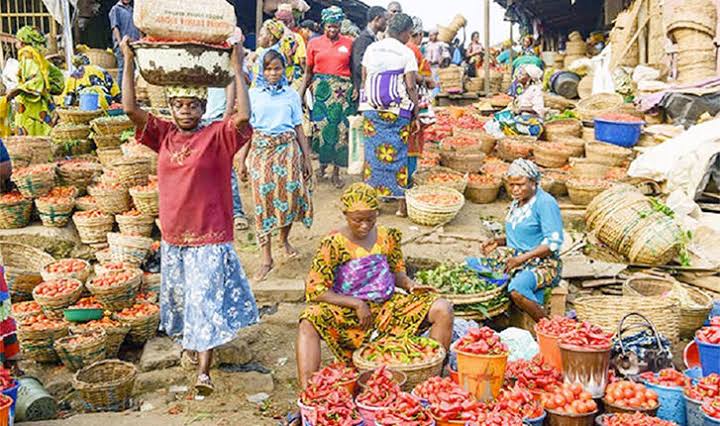LAGOS Nigeria (VOICE OF NAIJA) –Nigeria’s inflation has continued to rise daily despite reforms by the President Bola Tinubu-led team to ease pressure of the unfavourable economy on her citizens.
Small business owners are finding it difficult to sustain their trades as prices of items keep doubling the previous purchases, accounting to abysmally low purchase of agricultural goods, high cost of transportation fares, multiple taxation and many more.
In this report, VONa reporter, Tanko Lami takes a look at how Nigerians are coping with feeding and spending amidst the rising insecurity and soaring inflation on food items.
Nigeria’s economy is unfavourable for the masses, and the country is battling with cost-price inflation daily.
NBS reported that the inflation rate has risen to 31.7 per cent as of February, which represents the highest level of inflation recorded in 28 years
READ ALSO: Economic Hardship: Tinubu Directs State Govs To Begin Wage Award
A trader, Mrs Halima said: “Things are not really easy these days. You can take a certain amount to the market thinking you want to get everything you need but end up paying extra.
“For instance, if you budget to buy N1000 pepper in the market when u get their and realize how small it is you will end up increasing your budget to 1500 or even 2000 so your money won’t even be enough to buy other things you intend buying.
“At the end of the day, everyone has to manage. The fish we used to buy at N1000 before is now N2500; vegetables oil of N1700 before is now 4000 naira, so feeding and earning a living is so hard nowadays but we pray God see us through.”
Nigerians are seeking means to achieve two decent meals per day as there has been an incessant steady rise in price of food commodities that has caused hunger in the land.
Prior to the current state of the economy, monthly remuneration takes 15 to 25 percent of shopping of households food items but, as price of food items surges daily, over 50 percent of worker’s income goes into feeding.
READ ALSO:Economic Hardship: Reopen Border With Benin Republic, Monarch Begs Tinubu
In many homes, it has been extremely difficult to have a balanced diet due to the soaring inflation of household commodities.
Parents/Guardian have drastically cut expenses on allowances for their children every morning they leave for school even though such an amount can no longer afford them any comfort.
A civil servant and single mother, Ms. Abutu also shared her experience. She said her salary is no longer enough to foot her bills. “I can’t feed properly with my children. I can’t remember the last time I had a real balanced meal with my children.
“I can’t even save because once you go to the market food stuff is now like gold. A bag of rice is sold for N78,000; how can I afford it as a civil servant earning below that amount and I have other expenses too. We are tired and calling on the government to do something please,” she said.
In a statement released by the National Bureau of Statistics (NBS) , “Food inflation, which constitutes 50 per cent of the inflation rate, rose to 37.92 per cent in February from 35.41 per cent in January”
Today, acute hunger and insecurity have improvised many Nigerians and set the country in turmoil.
On March 3, FCT residents raid NEMA Warehouse and carted away food items stating the effect on economic hardship, VONa reported.
READ ALSO: FCT Resident Raid NEMA Warehouse, Loot Foodstuffs
So many families can’t boast of saving a token from their income as food prices take a large chunk of purchasing power of stomach infrastructure.
Despite the federal government’s efforts in tackling the current economic hardship, results are yet to be visible.
In a report published by the World Bank, Nigeria’s poverty rate rose from 40 per cent in 2018 to 46 per cent in 2023.
The World Bank said that the number of poor people in Nigeria increased from 79 million to 104 million.
The report stated that more people have fallen below the poverty line due to accelerating inflation, flopping naira, and slow growth.

A gas station manager, Mr John speaks about the support of his wife in mitigating the economic hardship.
He said: ” We hope on God always and with the help of my understanding wife, we have been able to find happiness in our home”
“Though expenses occur, we prioritise our needs in the house as they come. However, we didn’t cut down the children’s expenses.
“Things are not easy, no doubt and manufacturers are pointing fingers at the government’s unproactive policies and reforms but we have to keep pushing,” he said.
READ ALSO: FG Distributes 200,000 Broilers To Poultry Farmers In Ondo
In 2021, a report by the United Nations (UN) World Food Programme (WFP) had projected acute hunger spikes worldwide with Nigeria and 42 other countries mentioned.
The report at that time had rated the country’s human capital development poor. It also stated that more than half the population in the northern part of the country lives in persistent poverty.
It pointed out that “Around 110 million Nigerians, representing over 60 per cent of the total population, live below the poverty line.”
The FG established the Standards Trade Development Facility (STDF) aimed at bolstering market access for the country’s agricultural and health exports. This initiative is set to bolster agricultural exports and bring together both government and private sector stakeholders, with the goal to receive technical assistance and capacity building support from the World Trade Organisation (WTO) and the International Trade Centre (ITC).
In addition, President Tinubu has ordered the reopening of some land borders in order to facilitate.
The federal government has also moved to secure a $1bn loan from the World Bank. This loan is based on the alarming statistics revealed by the World Bank on increasing poverty in the country.
READ ALSO: FG Moves To Secure $1Bn World Bank Loans
On March 20, Minister of Agriculture and Food Security, Abubakar Kyari, said 42,000mt of grains promised by the federal government to unburden the pain of Nigerians has been released.
The Minister said a lot of states have started receiving their grains.
An Economist Experts Mr. Audu spoke to VONa on the method employed by the federal government in tackling the current economic woes.
On border reopening, “When you close borders, you reduce the quantity of commodities available. But when you reopen it, many products come in, and prices automatically drop,” Mr Audu said.
“Food production needs to increase and Government at all level needs to support farmers in terms of inputs.”
“The prices of food items will start coming down if security agencies stop herders and terrorists attacking farmers,” he added.
In addition he said the quantity of grains released to the populace is small as he called for an increase of the amount of grains released to Nigerians.




